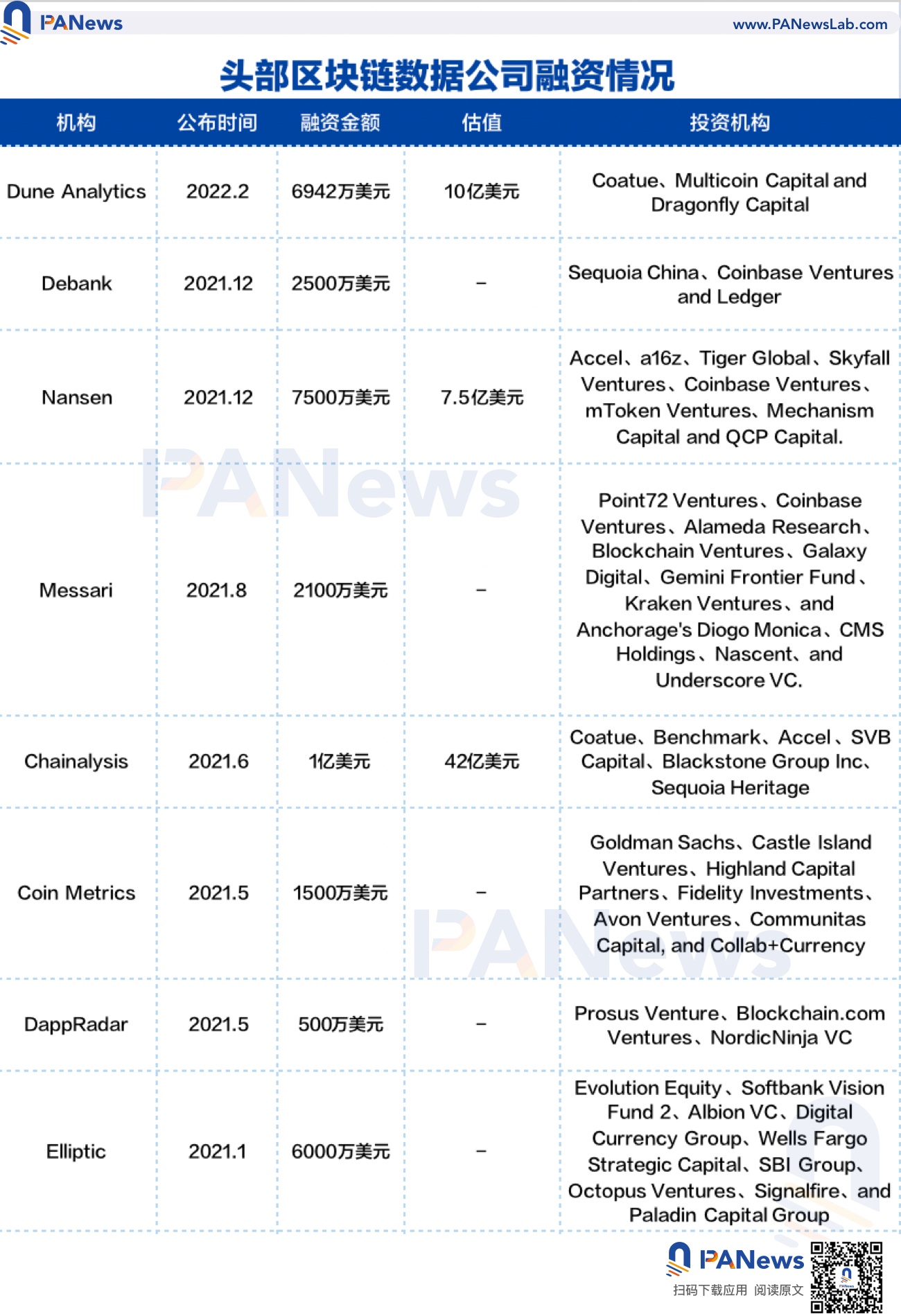细数加密数据服务赛道:估值动辄 10 亿美元,颇受受传统机构青睐
作者:0xHY,PANews
在大单频现的区块链一级市场,有一个赛道不容忽视,那就是区块链数据服务。这一赛道从2021年初以来就颇受资本青睐,涌现出不少独角兽企业。
数据是新时代的石油。在web2的世界里,体量最大的公司拥有最大量的数据。如果Facebook和谷歌比你更了解你自己,那也不足为奇。他们的商业模式在很大程度上取决于他们积累大量数据并很好地利用它们的能力。
谈到投资,这也是一个类似的故事。大型金融机构正在依靠数据来帮助做出决策。谁拥有最大量的数据和分析数据的能力,谁就能做出最好的投资决策。同样地,这些信息大多是保密的,普通人无法获得这些信息。
但区块链的数据是公开、透明且不可更改的,在web3时代,数据记录在公开的账本上,任何人都可以获取这些数据,但并不是人人都有提取如此大量的数据并加工整合的能力,数据服务机构应运而生。

10亿估值贵不贵
动辄估值达到十亿美金甚至几十亿美金的区块链数据服务公司,贵吗?
若以传统金融数据公司来类比,2019年,彭博的年收入达到100亿美元,2020年,全球市场为金融数据支付的总金额在300亿美金左右。
目前这些区块链数据公司并没有披露财务状况。在2021年6月的融资说明中,Nansen曾表示自身的收入增长了超过1000倍,如果这一倍增的基准是最初开始的几百美金的话,意味着Nansen当时的收入大约是几百万美金。
和大多数试图为用户博取阿尔法收益的数据服务机构不同,这一赛道中估值最高、已经融到第九轮的Chainalysis吃的主要是政府的单子,体量也更大。2020年Coindesk曾经通过翻阅82份联邦采购合同记录,计算出自Chainalysis成立以来,联邦机构已经在Chainalysis的工具、服务和培训上花费了至少1000万美元,如果算上可能延期的合同有可能达到1400万美元,这还仅仅是美国政府。不过,这样的生意模式也让Chainalysis饱受争议,例如比特币支持者安德烈亚斯·安东诺普洛斯就曾经炮轰Chainalysis是“不道德的”和“身处一场侵害隐私的军备竞赛中”。
但无论如何,如果我们假设加密金融最终会完全渗透进传统金融,即使是以10-20倍的市销率计算,这些公司的估值都应该是相当可观的,随着加密货币进一步被主流机构接受,对数据的需求只会越来越多,也就无怪乎这么多投资机构竞相挤入这一赛道来分一杯羹。
哪些风投机构青睐这一赛道?
相比加密圈原生的投资机构,有不少传统的投资机构在这一赛道多重下注,例如,Coatue领投了Chainalysis的E轮和Dune Analytics的B轮,Tiger Global领投了The Graph,同时也参投了Nansen最新一轮的融资,Accel在Nansen这一轮中领投,同时在Chainalysis去年6月的一轮融资中跟投。
区块链数据服务赛道是颇受传统投资者青睐的,Coatue这样双栖于传统金融与加密世界的机构自不必说,老虎基金也是大名鼎鼎,Accel甚至还要更老牌,成立于1984年。
这一赛道也见证了一些“old money”的加密世界投资首秀:亿万富翁投资者Steven Cohen旗下Point72 Venture领投了Messari的A轮,这是这一基金在区块链世界的首笔投资。
此外,高盛领投了Coin Metrics的B轮,Prosus Venture(原Naspers Ventures、腾讯最大单一股东)领投了DappRadar的A轮,红杉中国出手了Debank,领投Elliptic的Evolution Equity是一家成立于2008年、专注网络安全和企业软件的投资机构,和它一起出手的还有软银旗下的愿景基金。
对于传统机构而言,通过投资数据公司,相比获得财务收益,更重要的或许是战略性的布局。链上数据是反应加密世界的“晴雨表”,以及脱掉“滤镜”加密世界真实“素颜照”,布局这样的公司,相当于掌握了加密世界的核心情报,有助于老钱们在行业内进一步有的放矢地布局。
Nansen向左,Dune Analytics向右
在链上数据服务领域,目前普通用户接触和谈论最多的,应当是Nansen和Dune Analytics,他们也代表了两种不同的业务模式,孰优孰劣,并无定论。
有人认为,虽然Nansen可以凭借高客单价和不断累计的标签、地址特征值,在一个目前仍处于高速增长中的加密市场赚的盆满钵满,但由于链上数据本身是透明的,用户基数越大,付费用户所享有的不对称信息优势就越小,所以Nansen的生态注定是封闭的,与开放、由用户社区作出贡献的Dune Analytics截然不同,无法享受真正的网络效应。既然数据都是透明的,Nansen能做的产品,本质上Dune Analytics都可以做,例如对应Nansen的token god看板,Dune Analytics也有用户自主贡献创建的token god lite看板。
但也有人认为,虽然Dune Analytics的精神很web3,但类似这样的产品是无法卖给机构用户,试想在一个竞争高度激烈的市场中,机构用户是愿意选择一个高可用的产品,还是选择一个需要自己亲自下场写sql的高门槛产品呢?而这类数据服务的目标客户恰恰就是机构用户,Dune Analytics开始和基础设施提供商合作为币安智能链提供独家数据API服务本身就说明Dune Analytics也在向Nansen靠拢。
如果说数据本身无法建立护城河,保持不断推陈出新的产品力就成了重中之重,这一点Nansen表现的尤为出色。
以NFT板块为例,Nansen从2021年下半年开始就火力全开,紧紧跟随这一波NFT的爆发不断完善产品,6月份宣布推出NFT Paradise, NFT God Mode, NFT Wallet Profiler和NFT Item Profiler,追踪知名项目过去24小时内的交易量、市值、最高价和地板价,以及头部藏家的买卖动向、持仓等,7月份又推出NFT Leaderboards,引入“利润”指标,给予投资者更好的投资参考,11月推出Smart NFT Trader看板,列出在NFT利润方面排名前100位的地址和基于内部交易员得分指标的前100位地址,12月宣布和Rarity合作推出针对650+ NFT 项目的深度覆盖。
可以说,仅从NFT这一板块,就能看出Nansen强大的产品力和快速的迭代能力,这是保证用户能为其不断付出高昂费用的基石。
不可忽视的隐私问题
虽然这一赛道目前红红火火,但也不免引来质疑,其中最大的一点质疑就是:号称要将数据主权还给用户个人、理应对利用用户隐私深恶痛绝的web3世界,却长出了这么一批通过数据分析谋求高额利益的公司,这合理吗?
区块链的确做到了将数据还给用户,在利用链上数据这件事上,无论是政府、机构还是个人,都站在一条公平的起跑线上,监管机构和执法部门有能力对非法交易有充分的可见性,并跟踪其动向,使他们能够在一段时间内发现犯罪分子的身份。公司能够对供应商或第三方的交易有充分的可见性,并确保其合法性。个人能够看到“聪明钱”流向何方,以做出更明智的决定。理论上来说。环境是更加公平的。
而这些链上信息一旦与用户个人身份发生关联,这种隐私的泄露就是永久性的:你收藏过哪些NFT,参加过哪些活动,链接过哪些web2的账号,投资过哪些币种以及损益,和哪些人在链上发生过交互,通通一目了然。
如果我们依然逃脱不了在大数据的追踪下无所遁形,被定向的空投、推送、广告,这真的是web3的用户愿意看到的么?如何在保护好隐私的前提下提供数据服务,应当是这一赛道下一步必须考虑的问题。










